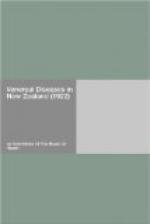The Committee recommend that the serving of notices, &c., under these sections be done by officers of the Health Department and not by the police. They also recommend that all proceedings taken under any Act having reference to venereal diseases should be heard in private unless the defendant applies for a hearing in open Court.
With regard to the effects of the actual operation of notification, examination, and isolation, the Commissioner of Public Health for West Australia, under date 25th August, 1922, advises the Committee that there is an increase in the number of cases attending public clinics, and that this is regarded not as evidence of increased incidence, but of increased interest and appreciation of early treatment by those suffering from the diseases.
SECTION 7.—MARRIAGE CERTIFICATE OF HEALTH.
The Royal Commission on Venereal Disease reported that there was a vast amount of ignorance as to the dangers arising from the sexual intercourse of married persons one of whom had previously to the marriage contracted syphilis or gonorrhoea. The effect upon the birth-rate, and the misery caused during married life, and in many cases to the offspring who survive, as they pointed out, are most serious, and the fact that the actual cause of the trouble often remains unknown and unrecognized prevents the calamity from serving the purpose of example or warning.
Some of the witnesses heard before the present Committee have urged that a certificate of good health, or at least a certificate of freedom from communicable disease, should be required from each party to a proposed marriage before the Registrar issued a license to marry. The Royal Commission considered that “it would not be possible at present to organize a satisfactory method of certification of fitness for marriage.” The National Birth-rate Commission, however, reported that in their opinion the question should be reconsidered with a view to legislation.
There is much to be said in favour of such a proposal from the point of view of national health. If the system were adopted the certificate should, in the opinion of the present Committee, include freedom from mental disease as well as freedom from communicable disease. But there are manifest difficulties in the way, chiefly in regard to the delicate and searching examination which would be required in the case of women before a doctor could certify positively to the absence of communicable disease.
The Committee recommend that instead of a medical certificate each party to a proposed marriage should be required to answer appropriate questions in regard to the presence or absence of communicable and mental disease, and to make a sworn statement before the Registrar as to the truth of the answers. It should be the duty of the Registrar to communicate the contents of the statements to the other party in the event of any admission of the presence of communicable disease.




